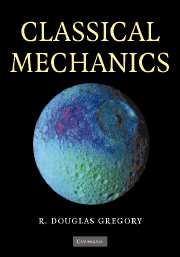Book contents
- Frontmatter
- Contents
- Preface
- 1 Newtonian mechanics of a single particle
- 2 Multi-particle systems
- 3 Analytical mechanics
- 12 Lagrange's equations and conservation principles
- 13 The calculus of variations and Hamilton's principle
- 14 Hamilton's equations and phase space
- 4 Further topics
- Appendix Centres of mass and moments of inertia
- Answers to the problems
- Bibliography
- Index
13 - The calculus of variations and Hamilton's principle
Published online by Cambridge University Press: 05 September 2012
- Frontmatter
- Contents
- Preface
- 1 Newtonian mechanics of a single particle
- 2 Multi-particle systems
- 3 Analytical mechanics
- 12 Lagrange's equations and conservation principles
- 13 The calculus of variations and Hamilton's principle
- 14 Hamilton's equations and phase space
- 4 Further topics
- Appendix Centres of mass and moments of inertia
- Answers to the problems
- Bibliography
- Index
Summary
KEY FEATURES
The key features of this chapter are integral functionals and the functions that make them stationary, the Euler–Lagrange equation and extremals, and the importance of variational principles.
The notion that physical processes are governed by minimum principles is older than most of science. It is based on the long held belief that nature arranges itself in the most ‘economical’ way. Actually, many ‘minimum’ principles have, on closer inspection, turned out to make their designated quantity stationary, but not necessarily a minimum. As a result, they are now known to be variational principles, but they are no less important because of this. A good example of a variational principle is Fermat's principle of geometrical optics, which was proposed in 1657 as Fermat's principle of least time in the form:
Of all the possible paths that a light ray might take between two fixed points, the actual path is the one that minimises the travel time of the ray.
Fermat showed that the laws of reflection and refraction could be derived from his principle, and proposed that the principle was true in general. Not only did Fermat's principle ‘explain’ the known laws of optics, it was simple and elegant, and was capable of extending the laws of optics far beyond the results that led to its conception. This example explains why variational principles continue to be sought; it is because of their innate simplicity and elegance, and the generality of their application.
Information
- Type
- Chapter
- Information
- Classical Mechanics , pp. 366 - 392Publisher: Cambridge University PressPrint publication year: 2006
